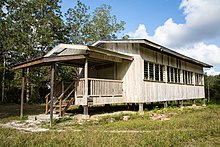Protestant Church in Sabah
| Protestant Church In Sabah | |
|---|---|
| Gereja Protestan Sabah Gorija Protestan Sid Sabah ( Basel Missionary Society | |
| Congregations | 322 |
| Members | 42,000 members baptised[2] |
| Ministers | 56 |
| Primary schools | 3 |
| Official website | www |

The Protestant Church in Sabah or PCS (
History
The roots of the Protestant Church in Sabah goes back to German missionary work in
Merger attempt with the Basel Christian Church
On 23 January 1968, the Basel Missionary Society started advocating a merger of both their Sabah affiliates; the BCC and PCS. A joint mission consultation was held in Kota Kinabalu on 9–13 May 1969 and was also joined by the Lutheran Church in America. However, the merger discussions did not reach an agreement due to concerns that the better organised and financially stable Basel churches may dominate the new body. Further discussions were planned but had to be shelved when crisis hit the Christian community of Sabah as a result of a policy change by the United Sabah National Organisation (USNO) led state government to suspend the renewal of missionary visas as part of the administration's Islamisation campaign.[1][8][9]
Consolidation
By 1973, the departure of foreign missionaries saw the BCC playing a more direct role in providing support for the PCS. Training of local workers was prioritised while contacts were developed between the PCS and other churches in Malaysia. In 1975, the PCS became a member of the World Council of Churches.[7]
Expansion beyond Sabah
In 1996, congregations were established in
Leadership
Since the PCS was organised in 1965, the head of the Executive Council is known as the President. The current president, Bishop Justin Sansalu is the ninth of the PCS.[10]
- 1964-1967
- Rev. T.A. Forschner
- 1967-1970
- Rev. Otto Dilger
- 1970-1976
- Patrick Manjil Madalag
- 1976-1992
- Rev. Masandu Majupi
- 1992-2000
- Rev. Hendry Ogodong Dangki
- 2000-2008
- Rev. Sopirid Masandu
- 2008–2012
- Rev. Jimmy Ojlim Assam
- 2012–2020
- Rev. Jensey Mojuin
- 2020–present
- Bishop Justin Sansalu
Schools and colleges
Theological training
In 1956, a Bible school was established in Tinangol near Kudat and continued to operate until 1973 when the USNO led Islamization campaign in the state of Sabah was at its height. The institution was re-opened in 1976 after the fall of the USNO-led administration as the Tinangol Bible Training Centre (Malay: Pusat Latihan Alkitab Tinangol).[11]
Vocational training
An agricultural school was established in Sikuati. The school was relocated to Timangol in 1965 and is currently known as the Women's Development Centre (Malay: Pusat Pembangunan Wanita).[11][12]
Academic
In 1964, the Basel Mission established three primary schools known as Native Voluntary Schools in the vicinity of Kudat. These were handed over to the PCS when the mission withdrew from Sabah and are currently operating as grant-in-aid schools:[11]
- SRK Lajong
- SRK Tinangol
- SRK Lodung
Affiliations
The PCS participates in ecumenical relationships through:
- World Council of Churches
- Federation of Evangelical Lutheran Churches in Malaysia & Singapore
- Asia Lutheran Communion
References
- ^ a b c Reformed Online: Gereja Protestan Di Sabah (URL last accessed 25 February 2010)
- ^ "PCS, Protestant Church in Sabah".
- ^ a b Asian Lutheran News: "Lutheran World Federation Regional Office for Asia"; Page 8, Issue 36; November - December 2007; Singapore
- ^ LWF Statistics 2009 Archived 21 August 2010 at the Wayback Machine
- ^ Lutheran World Federation: Member Churches Archived 12 December 2007 at the Wayback Machine - See individual denominational statistics for comparison (URL last accessed 20 December 2007)
- ^ T.A. Forschner: "The History of the Protestant Church in Sabah" (English translation of "Usuran do Gorija Protestan sid Sabah, 1993" [1][permanent dead link] (URL last accessed 26 March 2010)
- ^ a b c World Council of Churches: Protestant Church in Sabah Archived 20 May 2011 at the Wayback Machine (URL last accessed 25 February 2010)
- ^ Tsang Kwok Fu (ed): "BCCM Centenary Magazine 1882 - 1982", page 34, Kota Kinabalu: The Basel Christian Church of Malaysia, 1983
- ISBN 983-40840-0-5
- ^ Gereja Protestan di Sabah: Exco PCS 2008-2012[permanent dead link] (URL last accessed 25 February 2010)
- ^ a b c Various authors: "Usuran Do Gorija Sompomogunan om Usuran Do Gorija Protestan Sid Sabah", Kudat: Gereja Protestan di Sabah, 1993
- ^ Gereja Protestan di Sabah: Pusat Pembangunan Wanita PCS Archived 6 August 2010 at the Wayback Machine
